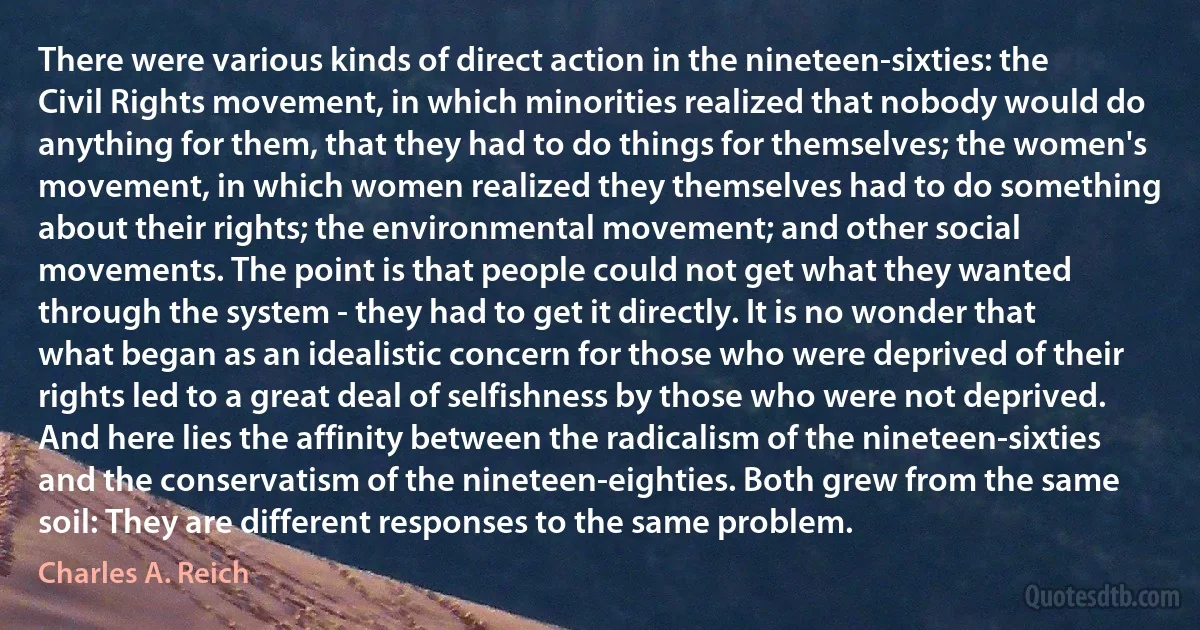
There were various kinds of direct action in the nineteen-sixties: the Civil Rights movement, in which minorities realized that nobody would do anything for them, that they had to do things for themselves; the women's movement, in which women realized they themselves had to do something about their rights; the environmental movement; and other social movements. The point is that people could not get what they wanted through the system - they had to get it directly. It is no wonder that what began as an idealistic concern for those who were deprived of their rights led to a great deal of selfishness by those who were not deprived. And here lies the affinity between the radicalism of the nineteen-sixties and the conservatism of the nineteen-eighties. Both grew from the same soil: They are different responses to the same problem.
Charles A. ReichRelated topics
action anything begin conservatism deal different great women led nobody people point problem radicalism selfishness soil something wonder things liesRelated quotes
When alone he secretly shook his head. But suddenly he recalled the analysis made by the Party secretary regarding "two kinds of social system, two attitudes, and therefore two different results." He felt as if he had seen a ray of light in the darkness. He said to himself, "Lao Chiu can endure pain of such magnitude, and in spite of his burns he is always thinking of going back to the furnace. He wants to live. Why should he not be able to live?" That moment, suddenly the doctor and the patient were drawn closely together. From then on, the doctor thought of the patient often and also tried to compare himself with Lao Chiu. The more he compared the more he felt ashamed of himself and the more eager he was to do his best for this worker. So, from the very first day the assistant surgeon learned something from his patient.

Ba Jin
National weakness - real or perceived - can tempt aggression and thus cause war. That's why the United States cannot neglect its military strength. We must and we will remain strong. But with equal determination, the United States and all countries must find ways to control and reduce the horrifying danger that is posed by the world's enormous stockpiles of nuclear arms.
This has been a concern of every American president since the moment we first saw what these weapons could do. Our leaders will require our understanding and our support as they grapple with this difficult but crucial challenge. There is no disagreement on the goals or the basic approach to controlling this enormous destructive force. The answer lies not just in the attitudes or actions of world leaders, but in the concern and demands of all of us as we continue our struggle to preserve the peace.

Jimmy Carter
A Frenchman is self-assured because he regards himself personally both in mind and body as irresistibly attractive to men and women. An Englishman is self-assured as being a citizen of the best-organized state in the world and therefore, as an Englishman, always knows what he should do and knows that all he does as an Englishman is undoubtedly correct. An Italian is self-assured because he is excitable and easily forgets himself and other people. A Russian is self-assured just because he knows nothing and does not want to know anything, since he does not believe that anything can be known. The German's self-assurance is worst of all, stronger and more repulsive than any other, because he imagines that he knows the truth -- science -- which he himself has invented but which is for him the absolute truth.

Leo Tolstoy
For what advantage is it, that the world enjoys profound peace, if thou art at war with thyself? This then is the peace we should keep. If we have it, nothing from without will be able to harm us. And to this end the public peace contributes no little: whence it is said, ‘That we may lead a quiet and peaceable life.' But if any one is disturbed when there is quiet, he is a miserable creature. Seest thou that He speaks of this peace which I call the third (inner, ed.) kind? Therefore when he has said, ‘that we may lead a quiet and peaceable life,' he does not stop there, but adds ‘in all godliness and honesty.' But we cannot live in godliness and honesty, unless that peace be established. For when curious reasonings disturb our faith, what peace is there? or when spirits of uncleanness, what peace is there?

John Chrysostom
Don't forget that God sees you and watches you when you are in pain; He perceives even the beating of your heart. Consequently, He will not leave you without consolation and His fatherly protection. Naturally, the saints rejoiced in their afflictions; as for us, let us at least manage to accept affliction or pain patiently.
My child, pray within your heart, and the name of Jesus will become for you a comforting balm so that you can bear this trial of yours in a way which benefits you. You will greatly benefit from this trial if you submit yourself to it patiently. So again I say to you, with the almighty armor of prayer continually approach the omnipotent Lord more often, and you will come to know how He wondrously lifts the burden of pain and marvellously gives rest to sufferers.

Ephraim of Arizona
